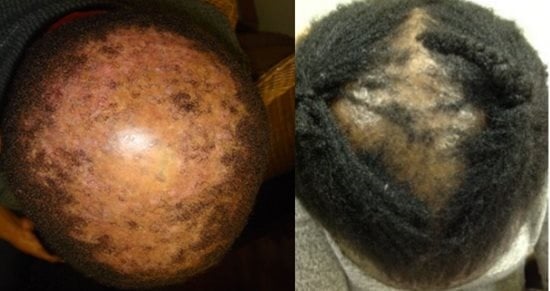For African women suffering from hair loss especially around the crown of the head, it just turns out that there could be a genetic reason for this. Following an extensive study, an internationally-renowned South African dermatologist, Ncoza Dlova, has discovered that a newly identified gene might be the cause of hair loss in women of African descent
Dlova, who is also the University of KwaZulu-Natal’s Dean of Clinical Medicine, worked alongside a team of scientists to conduct this ground-breaking study from 2013 to 2017.
According to the university, patients with Central Centrifugal Cicatricial Alopecia (CCCA) were recruited from Durban, South Africa, from 2013 through 2016 and in Winston-Salem, North Carolina, from 2014 through 2017.
CCCA is defined as hair loss or spot balding that starts from the central (crown) part of the scalp and radiates outward in a circular pattern. It causes a destruction of the hair follicles leading to scarring and permanent hair loss, according to health24.

This condition has often been confused with female pattern hair loss or common baldness which is a completely different entity, said the university.
The condition has also been blamed on the use of damaging chemical products on the hair and the application of hot combs, heat brushes or straighteners but the study suggests otherwise.
The study, titled “Variant PAD13 in Central Centrifugal Cicatricial Alopecia”, found that the gene – peptidylarginine deiminase 3 (PAD13) – which helps hair shaft growth, was mutated in most of the affected patients suggesting that the disease is genetically heterogenous
The distinct variants in PAD13 in each of the disorders may also account for the difference in clinical outcomes, the study said
Research suggests that PAD13 mutations predispose individuals to CCCA and this is usually triggered by some damaging hair grooming practices including the use of chemicals, traction, heat, braids and weaves, health24 notes.
In effect, affected families in the study have been advised to stay away from the aforementioned grooming practices.

In a statement released by the university, Dlova said that the discovery is “probably the biggest breakthrough in South African Dermatology”
“This discovery is a first in the world, and it followed links to my earlier publication of 2013, in which I reported for the first time a familial association in a cluster of black South African families with CCCA and have been following the 15 families for 5 years, and 7yrs later a gene has been identified.
“This has huge implications on early diagnosis, prevention and possible future targeted therapy of CCCA,” said the university professor who is being hailed worldwide for her discovery.
“None of this would have been possible without the families and our patients showing the will to participate in our research endeavours. I am also grateful to my local and international colleagues for working with me and this is indeed testimony to the power of diversity in research,” Dlova added.
The study has since been published in the New England Journal of Medicine, one of the most prestigious peer-reviewed medical journals. Larger studies are still needed in order to justify genotyping of asymptomatic women, the university said.










